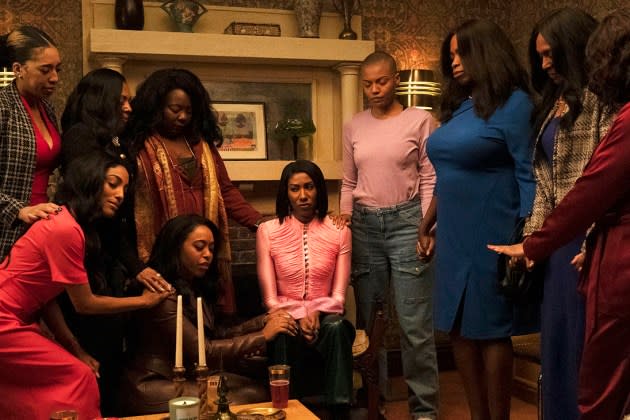‘Diarra From Detroit’ Review: BET+’s Mystery-Comedy Serves as a Sparkling Showcase for Creator-Star Diarra Kilpatrick

It would be a stretch to describe BET+’s Diarra From Detroit, about a schoolteacher getting sucked into the criminal underground via a decades-old missing persons case, as “relatable.” But the sly punchline is that it starts in a familiar place. You see, Diarra (Diarra Kilpatrick) only gets caught up in the mess because she’s looking for Chris (Shannon Wallace), the Tinder date who ghosted her after a single magical evening. Who could blame her for wondering why, and for seeking out literally any explanation besides coldhearted rejection?
In this case, Diarra’s seemingly unhinged conspiracy theory turns out to be true, thus pulling her down a path that’s part noir-infused mystery and part midlife-crisis comedy. If the marriage between the two isn’t always as smooth as it could be, Diarra From Detroit still shines as a fun and funny showcase for Kilpatrick, its creator as well as its star.
More from The Hollywood Reporter
In Diarra’s defense, her break toward what her friends term “crazy white woman” behavior doesn’t come out of nowhere. (“I’m just a concerned citizen,” she protests, to which they reply: “Yeah, that’s some shit a crazy white woman would say.”) We first meet Diarra months into a separation from the rich and handsome Swa (Morris Chestnut), which has left her tossing and turning alone all night in her childhood home. Her night with Chris represents the first time she’s felt herself in months, so when he stands her up for their second date, she can’t bear to let him go. Over her pals’ eminently reasonable suggestions that he might simply be a jerk, she sets out to find her elusive lover, who may or may not be linked to a little boy who disappeared from the area decades earlier.
Like Diarra herself, whose tendency to get involved in her students’ business has earned her the nickname “Captain Extra,” Diarra From Detroit tries to do a bit too much. The three 40ish-minute episodes sent to critics (out of eight) run shaggy with jokes, while the mystery progresses at an incremental pace. And so far, at least, subplots about Diarra’s pal Aja (DomiNque Perry) trying to grow her salon business (name: Detroit Blow Jobs) or their other buddy Mr. Tea (Bryan Terrell Clark) looking for romantic connection feel like little more than distractions from her main arc. The remaining five episodes of the season might eventually be able to weave all of these disparate threads together into a satisfying tapestry, or it might not. Diarra From Detroit‘s plotting is uneven enough that it seems it could go either way.
What comes through from the jump, however, is Kilpatrick’s sly sense of humor. She’s a delight to watch as Diarra — plucky, playful, a little bit loopy — but she is, if anything, even more entertaining to listen to. Frequent voiceovers let us into Diarra’s internal monologue. At some points it takes on the wry observational humor of a standup set (“on Eminem: “White men do anger and camping better than anyone. Money, power and respect must be infuriating, ’cause they stay hot”). At others it plays like a winking parody of an erotic thriller or a hardboiled noir (on her postcoital slumber with Chris: “He had teased me with a full 8 hours of sleep, and I was addicted after one hit”).
Occasionally it brushes up against sincere pain, though even then Diarra is good at locating the joke. “Some moments in life are mercilessly unforgettable. But you can’t call in traumatized to work. If you could, the district might not have many teachers. Or students. Or parents,” she thinks to herself in the bathtub after a violent encounter. “And being a Black woman makes everything more difficult. You can’t even take a trauma shower without worrying about getting your fucking hair wet.”
Diarra From Detroit doesn’t take its thriller elements overly seriously; even with a gun to her head, Diarra has the wherewithal to ask that she be allowed to remove her headscarf, “so I won’t be looking like Harriet Tubman in the crime scene photos.” But it does, in its own goofy and roundabout way, extend sincere empathy toward her plight as a woman reeling from the shock of divorce. The mystery really keeping her up at night is how she got to where she is and how she might go from here, and her search for Chris becomes a way for her to find herself again.
The most touching relationship in the entire series is not Diarra’s white-hot chemistry with Chris but the reinstatement of her childhood friendship with Moni (Claudia Logan), through which Diarra is able to come back to the woman she was before her marriage. Her most thrilling discoveries have more to do with what she’s capable of than what Chris might be. In the most amusing of the first three chapters, she chases a lead all the way to a sex club where she’s pleasantly surprised to discover a taste for kink — despite having previously been so buttoned-up she admits to not always getting Megan Thee Stallion’s racier lyrics.
Indeed, the truest sign that Chris might actually be Diarra’s soulmate is the fact that he identifies her investigatory spirit before his disappearance even gives her an opportunity to exercise it. “You’re one of those weird chicks who likes to go through every ugly detail that led to this exact moment, aren’t you?” he says minutes into their first date, intrigued more than irritated. “You think having all the answers will save you from the inevitable pain of the human experience.” He means to suggest that it won’t, and he is probably right about that. But Diarra From Detroit sure makes it enjoyable to watch a gal try.
Best of The Hollywood Reporter

 Yahoo News
Yahoo News 